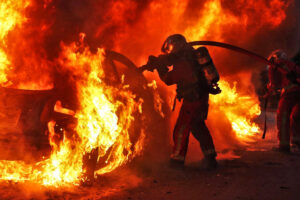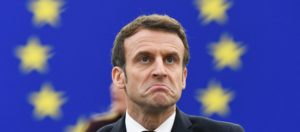Five years ago today, Paris was liberated. Or, if you were a Parisian, the streets of the capital were blocked by tens of thousands of ploucs (yokels) in high-vis jackets. Right from the start, the Gilets Jaunes rebellion defied the usual rules for French political theatre of the streets. Half a million people, young and old, male and female, working-class and middle-class, mostly provincial and mostly white, and many previously politically inactive, captured towns and roundabouts all over France.
Wearing the yellow vests was a stroke of political genius. The protesters were saying, in effect: “We have been forgotten or ignored by the insolent, thriving France of the big cities. From now on, we will be highly visible.” The bib — which French motorists have to carry by law in their cars — gave the protesters a uniform and a sense of camaraderie. Like almost everything about the Gilets Jaunes, that proved to be misleading.
The protesters quarrelled from the beginning. France would be a better place, they said, if there were no politicians. The people would govern directly through perpetual referenda. Anyone who emerged as a Gilets Jaunes leader was suspected of wanting to be a “politician” and insulted and rejected. They tried to invent a kind of non-ideological anarchism but could never agree what that meant.
Protest became insurrection. At the movement’s peak, in late 2018 and early 2019, the Gilets Jaunes briefly threatened the institutions of the French state. The Elysée Palace was besieged. The Arc de Triomphe was vandalised. A ministry was attacked by a mechanical digger. There was also a rash of attacks on town halls, politicians’ houses and motorway toll stations.
The state responded to their violence — mostly initiated, in my experience, by the militant wing — with violence. Five demonstrators lost hands and 24 lost eyes to police plastic bullets or stun grenades. Some of the victims were peaceful protesters.
This disappointed many of the original Gilets Jaunes supporters. All the same, the movement continued. There were more than 70 actes — or weekend putsches — of decreasing size before the Covid pandemic brought them to an end. At that point, few of the original Gilets Jaunes remained.
It had begun as a provincial rejection of Paris, politicians, parties, trades unions, the media and all ideologies of the Left, Right or centre. It was simultaneously Poujadiste, demanding less state and less taxes, and state-interventionist, demanding more services and subsidies for the peripheral France of the countryside and outer-suburbs. By the end, however, it was largely urban and Leftist.
Their profile changed bodily, not just demographically. A typical Gilets Jaunes march in the early days was full of wide-bodied provincials — left-behinds with big behinds. By the end, they were mostly slender, metropolitans in their twenties, thirties and forties. Their slogans were not just anti-Macron but anti-capitalist. A typical banner at one of the last Paris marches read: “Capitalism is organised crime.”
The French media was oddly reluctant to recognise this gradual capture of the movement. It was quicker to seize on the fact that some of the original “personalities” (never say leaders) were connected to the far-Right. They were dismissed as racists. They were portrayed by commentators on the Left as a working-class revolt against globalism, which was brutally suppressed by “Macron’s militias”. They were dismissed by the pro-European, liberal centre as Putin’s poodles, manipulated by lies online. All those portraits are misleading; all contain an element of truth.
In the beginning, it was about pump prices. But that fury set ablaze other provincial grievances: the erosion of public services; low wages; the high cost of living; a new tax on some pensions; Macron’s decision to partially abolish a tax on wealth. On top of this came a decision to reduce the speed limit and country people believe that speeding fines are a crafty way of taxing the ploucs or péquenauds — yokels or rednecks — to subsidise the cities.
One of the central beliefs of the Jaune “philosophy” could be summed up as follows: “All politicians are corrupt and they steal our money. We finance the success of the Bobo (Bourgois Bohemenian) elites in the big cities. They do nothing for us.” But in a recent book, the economist Laurent Davezies dismantled that founding Gilets Jaunes mantra. In fact, he calculated, French cities hugely subsidise the countryside and small towns. The greater Paris area, the Ile-de-France, creates 31% of the nation’s wealth but pays itself only 22% of national income. The rest goes in state transfers to rural or provincial France. In the poorest rural communes, state spending is 36% higher than the national average.
All the same, it is undeniable that life, jobs, and local sources of pride and wealth have drained from large tracts of provincial France in recent decades — as they have from similar parts of Britain and the United States. Simultaneously, middle- and lower-income people have been squeezed out of the booming cities into unlovely, distant suburbs. They rely on cars to commute to work as outer suburban public services are often, by French standards, poor. These were the twin breeding grounds of the Gilets Jaunes: the small towns outside the glow of France’s booming Metro areas; or the featureless outer ring of conurbations (Paris, Toulouse, Bordeaux, Montpellier) or large towns (Rouen, Caen, Rennes and Nantes).
José-Edouard, a 61-year-old retired building contractor, spoke to me beside a roundabout in rural Calvados on the second weekend of protests on 24 November 2018. “We’ve been betrayed by every president and prime minister for 40 years. Everything has been for big finance, for the banks, for the wealthy and nothing for the people in the middle or at the bottom,” he said. “Every local source of wealth in provincial France, every local economy (bassin d’emploi) has been drained. People can no longer live on what they earn… They are crushed.”
As the movement bounced from anger at petrol prices to attempted revolution, allegations ranged from the reasonable to the lurid and absurd: France was being sold to the UN; taxes were almost all wasted on the gilded lifestyles of politicians (in reality, less than 0.1% goes to them); Brigitte Macron had a de facto state salary of €500,000 a year (in reality, zero). My local roundabout became microcosm of the fragmented, yellow-clad anti-politics nationwide.
José-Edouard soon broke away with a group of followers. Those who remained — including a home-carer, a warehouse worker, an unemployed father of two — made unflattering remarks about him. He wanted to impose his own political line; he had decamped with their €500 cagnotte (kitty) collected from motorists.
Yet they remained as determined as ever. The movement was not just a protest, they said. It was an uprising. All governments would be controlled in future by popular votes online or Référenda d’Initiative Citoyenne (RIC). There would be higher pensions, lower taxes, better services and better welfare payments. All would be financed from the billions saved when the salaries and expenses of politicians were abolished. In a few weeks, however, they had reduced their roundabout picket to Saturdays only. In a few more weeks, they were all gone.
There was a triple paradox at the heart of the original Gilets Jaunes movement. The first was that, while it started and spread rapidly online, it also rescued people from the rural-suburban isolation of their homes. It became a social club as well a social movement. The second is that, although the absence of leaders attracted broad early support, the lack of direction allowed the movement to be hijacked by organised forces, initially from the far-Right, finally by the Left. There were street battles in Lyon, Paris and elsewhere in the New Year between hard-Right and hard-Left urban guerrillas, both groups wearing yellow vests. The Left, partly in the nebulous shape of the Black Bloc movement, eventually won.
Then there was the fact that the movement, despite its grandiose threats, never had enough support or any remotely workable plan to bring down the French state. President Macron, after a shaky early response, responded skilfully. His Great National Debate allowed people to express and relieve some of their anger. And €10 billion in tax cuts for low and middle incomes and a boost to the minimum wage blunted the edge of fury in Middle France.
Apart from this, the Gilets Jaunes achieved little. They ruined their case by overstating it. They said that leaders were not necessary, but they proved that they were. They were determined to bring down Macron, but he was re-elected last year. While Macron has adopted their demand for more direct democracy and wants to simplify the rules for popular referenda in France, his plan will not look anything like the laptop governments proposed, but never defined, by the Gilets Jaunes.
All the same, the movement revealed a profound animosity towards the ruling elite which cannot be easily dismissed and remains unappeased. The origins of that animosity — even hatred — are rooted in a crisis of distrust, disinformation and dislocation that confronts all 21st-century representative democracies. In France, mainstream parties, the media, the church and the trades unions have lost respect.
The Gilets Jaunes detested Macron because, they said, he had claimed to be a different kind of politician, but he was the same as his predecessors. In a sense, they were Brexiteers without Boris, or Trumpers without Trump. If they had found and accepted a charismatic leader, they might have gone further.
Will they rise again? I doubt it. A small number of die-hard, rural Yellow Vests remain, but they are marginalised and discredited. Some time ago, I tracked down José-Edouard again (although it turned out that he had given me a false name). He lives in a rather grand converted water mill. He denied he had run away with the “kitty”. He said he left because the others were making racist remarks and that he donated the money to the benevolent fund for fire-fighters. “José-Edouard” still blamed banks, globalism, the European Union and corrupt politicians for the ills of provincial France. Like so many of his former comrades, he has stopped believing that he can do anything about it.
Disclaimer
Some of the posts we share are controversial and we do not necessarily agree with them in the whole extend. Sometimes we agree with the content or part of it but we do not agree with the narration or language. Nevertheless we find them somehow interesting, valuable and/or informative or we share them, because we strongly believe in freedom of speech, free press and journalism. We strongly encourage you to have a critical approach to all the content, do your own research and analysis to build your own opinion.
We would be glad to have your feedback.
Source: UnHerd Read the original article here: https://unherd.com/






